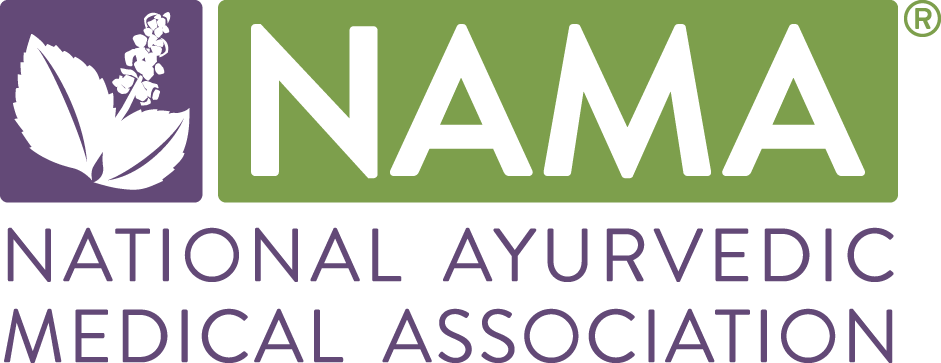by Baba Lou Haber
The 17th Annual Conference of the National Ayurvedic Medical Association (NAMA) brought together online 45 experts whose presentations centered on Ayurveda as evidenced-based and integrative medicine. The conference demonstrated how practitioners are harnessing scientific research to validate classical Ayurvedic approaches, growing expertise in disciplines of emerging importance such as microbiome research and genomics, and building bridges with Western medicine.
Integrative Medicine Defined
Among the first presenters was Victoria Maizes, MD, executive director and professor of medicine at the University of Arizona Andrew Weil Center for Integrative Medicine. Maizes offered a definition of integrative medicine as “healing-oriented medicine that takes account of the whole person, including all aspects of lifestyle” and “emphasizes the therapeutic relationship between practitioner and patient, is informed by evidence, and makes use of all appropriate therapies.”
An internationally recognized leader in integrative medicine, Maizes began with an alarming statistic from JAMA: Even though 70% of deaths in the United States are due to behavioral and environmental factors, only 1%–3% of healthcare dollars are spent on disease prevention, compared to 97%–99% spent on medical care and biomedical research. She emphasized how “something is missing from our healthcare systems, and we believe that we can do a better job taking care of our patients through integrative medicine.”
Innovative Integrative Approaches
That spirit of advancing a better way to improve healthcare and foster wellness was abundantly evident throughout the NAMA conference. Presentation topics included evidenced-based approaches to healing leaky-gut syndrome (in which an unhealthy gut lining allows undigested food and toxins to leak into the bloodstream); innovative therapies to address gastrointestinal tumors; Ayurvedic approaches to mitochondrial diseases and disorders (which occur when mitochondria fail to produce sufficient energy for the body to properly function); and Ayurvedic prevention and treatment of gynecological disorders.
Among the presenters on yoga were Susan Bass, AP- and AYT-NAMA, E-RYT 500, C-IAYT, a certified Ayurvedic practitioner and Ayurvedic yoga therapist who founded the Sarasvati Institute of Ayurveda & Yoga Therapy and the Sarasvati Mission. “Ayurveda excels at digestion and detoxification, so it is about improving the quality of blood,” noted Bass. “That’s why Ayurveda and yoga are exponentially more effective when practiced together, because who cares if you have the blood moving around the body when it is of poor quality and does not nourish the cells and the organs?”
Bass led two sessions. The first examined the beneficial role of yoga in reducing stress and improving mental health. In her second presentation, Bass brought together asana, pranayama, mudra (gestures), and marma (vital body junction points) therapy to address vishama agni (irregular/weak metabolism), the type of digestive imbalance caused by excess vata (air/wind).
A Deeper Understanding of “Evidence”
Bhushan Patwardhan, PhD, national research professor at the Interdisciplinary School of Health Sciences, Savitribai Phule Pune University, provided an overview of Ayurveda as an evidenced-based science. He emphasized that Ayurveda and yoga require a different approach to research and a fresh look at what constitutes evidence, given that they have an entirely different framework than Western medicine.
According to Patwardhan, the integration of Ayurveda and modern medicine will entail an “epistemological transformation process” in which Ayurveda as a holistic, experiential, and natural approach will need to be more fully appreciated and understood by medical practitioners and the medical research community.
A New Paradigm to Foster and Sustain Health and Wellness
In her presentation “Biodiversity Is Health; Biodiversity Is Sustainability,” Vandana Shiva, PhD, likewise emphasized the critical importance of a paradigm shift—one to a more holistic understanding of health that includes our interconnectedness with all species and the entire planet.
“The paradigm we have today is one that doesn’t work with whole systems,” said Shiva, a researcher and eco-feminist food-sovereignty activist who founded the Research Foundation for Science, Technology, and Ecology in Dehradun, India. In contrast, Shiva noted, Ayurveda teaches us that health is about balance. “The body is not little fragments and parts; the body is a non-separable whole interacting non-separably with the world and the biodiversity around us,” she said.
Shiva ended her talk with a call to action. “If there is one thing we can take forward from ecology, from biodiversity, from Ayurveda, it is our interconnectedness,” she said. “We are one, and we can be interconnected through health and regeneration, or through disease and degeneration. [E]ach of us should cultivate the will and determination and the hope that the regeneration part is what we will evolve.”
A Look at COVID-19
NAMA additionally offered a post conference event providing perspectives from conventional medicine and Ayurveda on COVID-19. The presentation, by Dhaval Dhru, MD, and Mimi Guarneri, MD, included a survey of preliminary research looking at promising results of both integrative and Ayurvedic treatments of the virus.
Throughout the conference, NAMA encouraged attendee donations to help the people of India during the country’s COVID-19 crisis through such organizations as Sewa International USA (www.sewausa.org).
Mark Your Calendars
Planning is already underway for NAMA’s next annual conference. The 2022 gathering will be a special event where participants will hopefully again meet in person. The theme of the conference, to be held in Tucson, Arizona, April 22–24, is “Ayurveda for Family Health.”
Originally published in Yoga Therapy Today, a publication of the International Association of Yoga Therapists (www.iayt.org). Shared with permission.
About the Author
Baba Lou Haber has written for CBS News, served as a communications executive for several companies and public agencies, and is a Cicero Award–winning speechwriter. He is currently studying to be an Ayurvedic Health Counselor. Baba Lou also serves as a member of NAMA’s Communications Committee.


